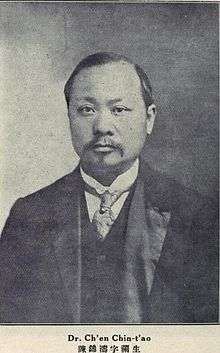Chen Jintao
| Chen Jintao | |||||||||
 | |||||||||
| Chinese | 陈锦涛 | ||||||||
|---|---|---|---|---|---|---|---|---|---|
| |||||||||
Chen Jintao (1870-1939) was a Chinese technocrat educated in America. He held various finance-related positions under a wide variety of Chinese governments. He was finance minister for warlords in Beijing, for Nationalists in Nanjing, and for the pro-Japanese Nanjing Regime. Chen was responsible for improvements in printing and engraving, as well as for various currency reforms.[1]
Early life
Chen was born in Nanhai in Guangdong Province in 1870. He graduated from Queens College in Hong Kong. He received a master’s degree in math from Columbia University in 1902. He received a doctorate in political economy from Yale University in 1906. When he returned to China, he received the highest score in an imperial exam for students returning from abroad. For this reason, he is sometimes referred to as China’s “first foreign scholar.”[1]
In 1908, Chen was appointed deputy director of the bureau of printing and engraving and sent on a mission overseas to investigate methods of postage stamp production. Chen concluded that American printing techniques were the best at preventing counterfeiting. He hired two American experts, William A. Grant and Lorenzo J. Hatch, to upgrade China’s postage stamp manufacturing.[1]
Public service
When he returned to China, Chen was appointed head of a currency reform board. Following the 1911 Revolution, President Sun Yat-sen, who at this time headed a southern government based in Nanjing, named Chen minister of finance. Chen did not take up the post as he was abroad attending currency-related conferences. When he returned to China in September 1912, Chen was appointed head of the central audit office in Beijing. In 1916, Chen was promoted to finance minister by Prime Minister Duan Qirui. When Duan was dismissed in May 1917, Chen was arrested for embezzlement. The Communications Clique was blamed for the arrest. Chen was exonerated in February 1918.[1]
Chen returned to public service when Duan was restored as premier in November 1924. In 1926-1927, the Nationalists in the South advanced north and defeated the Beiyang militarists based in Beijing. In the spring of 1927, the Nationalists arrested Chen in Hangzhou and accused him of collusion with the leftist Wuhan government. With the Nationalists in power, Chen became professor of economics at Tsinghua University in Beijing in 1929. In the early 1930s, Chen briefly retired to Tianjin. In early 1935, he was appointed as an adviser on currency matters to H. H. Kung, the Nationalist finance minister. In 1937, the Japanese occupied Nanjing, the Nationalist capital. While Kung and other officials fled to Chongqing, Chen remained at his post. In March 1938, he was appointed minister of finance in the collaborationist regime of Liang Hongzhi. The Liang regime had jurisdiction in the provinces of Jiangsu, Zhejiang, and Anhui. Chen retained this post until he died in June 1939.[1]
Before 1928, Chen was one of the few Chinese officials considered expert or competent by China’s foreign diplomats. He was responsible for significant improvements in printing and engraving. The currency reforms of the early Republican period may be credited to Chen. He was a technocrat who diligently served China, apparently indifferent as to whether the government was imperialist, militarist, Nationalist, or collaborationist. His views and motives remain elusive.[1]